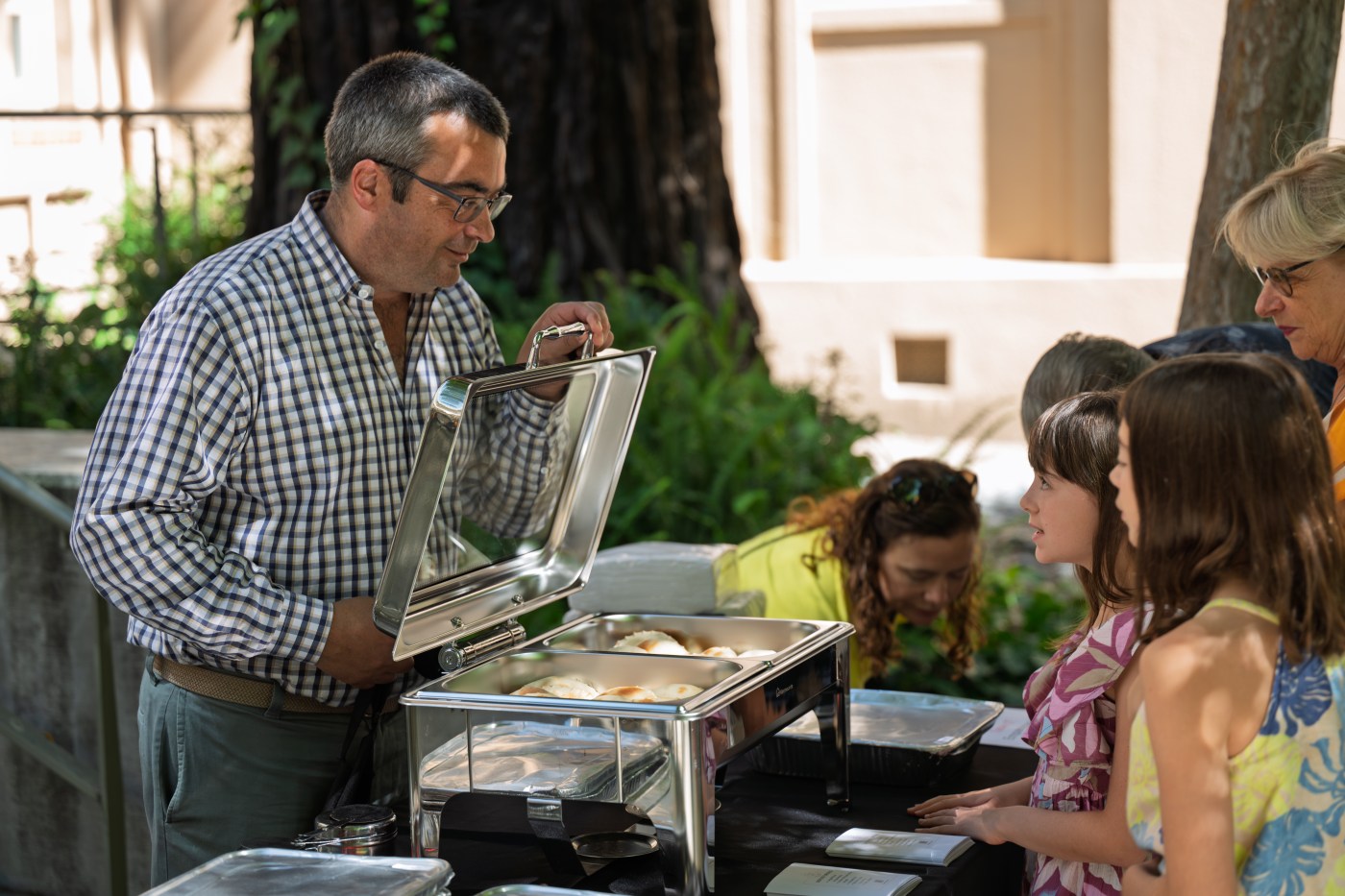As his 12-year-old autistic son Andy swooshes around a crowded courtyard, Tony Lam chokes up and his eyes swell with joy as he glowingly talks about the business venture he founded in his child’s name.
Related Articles
Valley Fair offers Foodie Week restaurant deals through Aug. 17
These full service restaurants have deals in the $10 range
Everything old is new again in Palo Alto’s dining scene
Burger popup starts this weekend at Coyote Point
Elon Musk offers futurist concepts at his Tesla Diner, movie theater and supercharge station in West Hollywood
Lam, 50, was already a successful veteran of the tech and restaurant space — he was Wingstop’s store no. 293 before operating five of the restaurant chain’s now 2,500-plus locations around the world.
But Andy’s Cafe holds a special meaning for Lam beyond its name. He believes it can become a model for other businesses to employ both neurodivergent and neurotypical people simultaneously. Aided by Prosperity Lab’s Mesa Redonda Incubation & Commissary Kitchen, Lam aims to employ 12-15 people at the new Andy’s Cafe, which he hopes will open later this month at the Center for Employment Training (CET) in San Jose.
“When I was going through this journey of learning about autism, one of the statistics that really stood out to me the most was that 85% of them, when they reach adulthood, are unemployed,” Lam said. “During COVID, all these restaurants said, ‘I need workers,’ yet there are 85% saying, ‘Hire me,’ and so why is there a disconnect? I went to see how I could try and solve this and it was really frustrating, because there’s a stigma with restaurant owners and other businesses not really wanting to hire from this community.”
Andy’s Cafe was one of 25 aspiring food startups to graduate from the latest cohort of the incubator program created in collaboration with Prosperity Lab and CET and partially funded by Santa Clara County, the city of San Jose and the Sobrato Foundation.
Employees of Andy’s Cafe prepare drinks on Aug. 8, 2025, at an event held at the Center for Employment Training, celebrating graduates of Prosperity Lab’s Community-Centered Incubation & Commissary Kitchen. (Devan Patel/Bay Area News Group)
About a quarter of the businesses that took part in the most recent cohort were also street vendors, whom the city had targeted as part of a stricter crackdown on unlicensed vending in public right-of-ways.
Prosperity Lab CEO Mimi Hernandez said the program offers mentorship and teaches business skills, digital and financial literacy, marketing and helps aspiring entrepreneurs navigate health compliance, insurance and permitting processes, even if they have different goals.
“They have to be committed to doing the work and we’re going to give them all the tools and all the guidance,” Hernandez said. “We understand the concern, because we as well want to make sure that there’s trust in the way our street food vendors are presenting food and selling it, and to be fair, a feasible business is going to do their due diligence, their compliance, and it’s the first step. We want to get them into that ladder where they incubate with us, and then we have other private partners that will allow them to come in below market-rate once they have completed a one-year program.”
While the city is home to several large tech companies, minority-owned and small businesses remain the backbone of the local economy. Blage Zelalich, deputy director of the city’s office of Economic Development and Cultural Affairs, said that more than 60% of businesses are ethnic or minority-owned, while 95% employ 10 or fewer employees.
Those types of businesses are a significant part of the food and drink sector, which accounts for 15% of the total number of San Jose companies. Restaurants are also the highest subsector contributing to the city’s revenue stream.
Despite the challenges created by the pandemic, food and drinking establishments had not only rebounded by the end of 2022 and have now increased sales tax revenues by 21% since 2019 pre-COVID records.
While the city declined to provide specific sales tax figures, citing state and city privacy regulations, data from the California Department of Tax and Fee Administration showed that in 2024, food and drinking places in San Jose generated $2.72 billion in taxable transactions.
But for many of the startup businesses, Mesa Redonda has helped them realize that their compelling stories extend beyond just creating tantalizing food.
Katelynn Dawson, owner of The Michelada Lady, hands out samples of her drinks on Aug. 8, 2025, at an event held at the Center for Employment Training, celebrating graduates of Prosperity Lab’s Community-Centered Incubation & Commissary Kitchen. (Devan Patel/Bay Area News Group)
Katelynn Dawson, the 35-year-old owner of The Michelada Lady, credits Aline Crowder, who headed the program, for pushing her to grow her prepared Clamato mix, which she is selling directly to consumers and at bars, restaurants, and festivals.
If she could shoot for the stars, one day she would like to have a Coca-Cola-like truck, adorned with The Michelada Lady insignia.
After arriving in Silicon Valley eight years ago from the city of Salta in the northern part of Argentina as a software engineer, Sebastian Juarez, 47, said the Mesa Redonda program helped him realize he could transition careers into something he was just as passionate about.
While his wife was dealing with an autoimmune disease, Juarez started making authentic Argentinean empanadas with beef tallow after researching the dangers of processed foods and the unhealthy byproducts. Seeing the parallels between Northern Argentina and the Central Valley or wine country, Juarez’s ultimate goal is for Empanadas La Linda to become a staple at local farmers’ markets.
“I started cooking here in the same way, or trying to be more loyal to the way we cook it there,” Juarez said. “I started making them for family and friends and then I started being asked for orders, people asking me ‘Can you make me some for some party, gathering, or whatever?’ All of a sudden, I started a small business on the side and it kept growing.”
Emily Baysa, left, and Sebastian Juarez cut a ceremonial ribbon at an event held on Aug. 8, 2025, at the Center for Employment Training, celebrating graduates of Prosperity Lab’s Community-Centered Incubation & Commissary Kitchen. (Devan Patel/Bay Area News Group)
Hernandez said the Mesa Redonda program is aiming to hold ribbon-cutting ceremonies twice per year, with the next class starting in September that will have a greater focus on millennials.
And as San Jose grows, the program’s leadership knows the city will have an appetite for the next crop of food startups waiting in the wings.
“I think this is a beautiful opportunity to acknowledge that the sky is the limit, that there is no ceiling and that if we have 50 more in the program, 50 more will graduate,” CET President and CEO Ruben Solorio said. “There is a place for them in our community, because of the need in downtown San Jose and throughout this county.”





